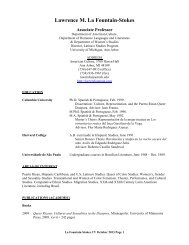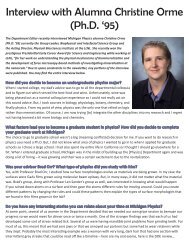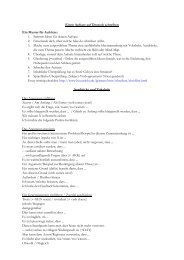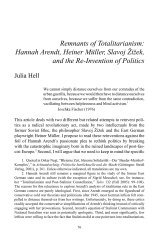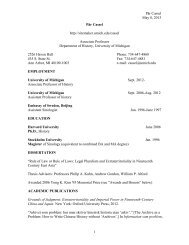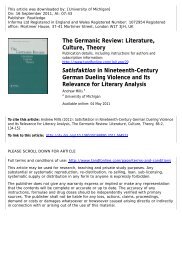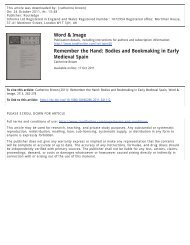Making History Personal: Constantine Cavafy and the Rise of Rome
Making History Personal: Constantine Cavafy and the Rise of Rome
Making History Personal: Constantine Cavafy and the Rise of Rome
Create successful ePaper yourself
Turn your PDF publications into a flip-book with our unique Google optimized e-Paper software.
Frier, “<strong>Making</strong> <strong>History</strong> <strong>Personal</strong>,” page 19<br />
2. The End <strong>of</strong> <strong>the</strong> Ptolemies<br />
<strong>Cavafy</strong> wrote six poems (that we have) on <strong>the</strong> events leading to <strong>the</strong> dissolution <strong>of</strong> <strong>the</strong> Pto-<br />
lemaic kingdom <strong>and</strong> <strong>the</strong> final Roman annexation <strong>of</strong> Egypt. 58 It is a story that was not only <strong>of</strong>ten<br />
retold in antiquity, but also frequently recounted by subsequent authors both academic <strong>and</strong> lite-<br />
rary—a story so widely known, in short, that, unlike with <strong>the</strong> decline <strong>of</strong> <strong>the</strong> Seleucid Empire,<br />
<strong>Cavafy</strong> had no need to supply expository background. 59<br />
The Roman general Antony’s seduction<br />
by <strong>the</strong> resourceful Egyptian queen Cleopatra VII, his eventual defeat in 31 by his rival Octavian<br />
at <strong>the</strong> naval battle <strong>of</strong> Actium, <strong>and</strong> <strong>the</strong> suicides <strong>of</strong> Antony <strong>and</strong> Cleopatra in 30—all <strong>of</strong> this was<br />
cultural currency long before <strong>the</strong> age <strong>of</strong> cinema. <strong>Cavafy</strong> instead adopts a roundabout strategy,<br />
homing in on details <strong>of</strong> crucial events. Again, it is helpful to look at <strong>the</strong> six poems not in <strong>the</strong> order<br />
<strong>of</strong> <strong>the</strong>ir composition, but in <strong>the</strong> chronological order <strong>of</strong> <strong>the</strong> events described.<br />
“Alex<strong>and</strong>rian Kings” was written in 1912. It concerns <strong>the</strong> Donations <strong>of</strong> Alex<strong>and</strong>ria in 34<br />
BCE, one <strong>of</strong> <strong>the</strong> pivotal moments leading to <strong>the</strong> final conflict between <strong>the</strong> erstwhile allies Anto-<br />
ny <strong>and</strong> Octavian. Briefly, through <strong>the</strong> treaty <strong>of</strong> Brundisium in 40, Antony had been left in effec-<br />
tive control <strong>of</strong> <strong>the</strong> Roman provinces in <strong>the</strong> Eastern Mediterranean. In 34, using Cleopatra’s<br />
funds, he won a significant victory over Armenia. But instead <strong>of</strong> returning to <strong>Rome</strong>, Antony celebrated<br />
a colorful “triumph” in Alex<strong>and</strong>ria. A short time later, he <strong>and</strong> Cleopatra held a public<br />
60<br />
ceremony in <strong>the</strong> Alex<strong>and</strong>rian Gymnasium, during which <strong>the</strong>y distributed vast expanses <strong>of</strong> <strong>the</strong><br />
East to Cleopatra <strong>and</strong> her children, including Ptolemy XV Caesar, called Caesarion (born in 47<br />
<strong>and</strong> widely reputed to be <strong>the</strong> natural child <strong>of</strong> Julius Caesar 61<br />
) <strong>and</strong> her three children with Antony:<br />
58<br />
On <strong>the</strong> historical background, see Pelling, “Triumviral Period” (1996). For this period, <strong>Cavafy</strong> appears to<br />
have relied mainly on ancient Greek sources (esp. Plutarch <strong>and</strong> Cassius Dio), not secondary sources.<br />
59<br />
Thus, he left unfinished two bitterly satiric poems attacking <strong>the</strong> decadence <strong>of</strong> <strong>the</strong> later Ptolemies: “Ptolemy<br />
<strong>the</strong> Benefactor (or Malefactor)” (1922) <strong>and</strong> “The Dynasty” (1923). Both are too broadly written.<br />
60<br />
The Gymnasium, famed in antiquity for its beauty <strong>and</strong> huge size, has not been located, except that it lay<br />
along Alex<strong>and</strong>ria’s main east-west thoroughfare (Strabo, 17.1.10); see Fraser, Alex<strong>and</strong>ria (1972) 28-29; Burkhalter,<br />
“Gymnase” (1992). As <strong>Cavafy</strong> was doubtless aware, Octavian, after defeating Antony <strong>and</strong> Cleopatra, held his own<br />
victory ceremony in <strong>the</strong> Gymnasium, with masses <strong>of</strong> apprehensive Alex<strong>and</strong>rians in attendance: Plutarch, Antony<br />
80.1.<br />
61<br />
On <strong>the</strong> evidence, see Heine, “Cäsar” (1969/2009), <strong>and</strong> Benne, Marcus Antonius (2001) 127-130, <strong>and</strong><br />
Schäfer, Kleopatra (2006) 87-93, summarizing <strong>the</strong> modern debate; also Roller, Cleopatra (2010) 69-74. Most ancient<br />
sources, reflecting contemporary polemic, are cautious as to Caesar’s paternity: Nicolaus <strong>of</strong> Damascus, Augustus<br />
20; Suetonius, Caesar 52.2 (noting, however, <strong>the</strong> close physical resemblance); Plutarch, Caesar 49.10, Antony<br />
54.4; Dio, 47.31.5. Heine points out that <strong>the</strong> correct form <strong>of</strong> Caesarion’s name was Ptolemy XV Caesar. His fre-






